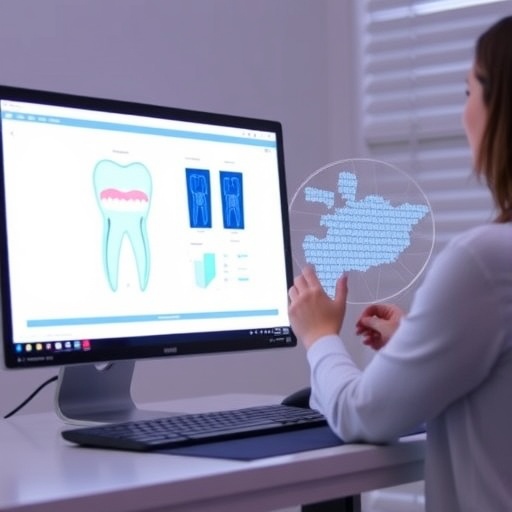In the rapidly evolving field of dental education, the integration of digital technologies is becoming increasingly essential. A groundbreaking study led by Mwogosi et al. investigates how these technologies can be effectively incorporated into clinical dentistry training, emphasizing a shift toward competency-based education. This innovative framework aims to enhance the learning experience and outcomes for dental students, preparing them for a future where digital skills are paramount in clinical practice.
Digital technologies in dentistry encompass a variety of tools, from virtual reality (VR) simulations to sophisticated imaging software. These advancements enable students to engage in experiential learning, allowing them to practice clinical skills in a safe and controlled environment. The study highlights that traditional teaching methods often lack the capacity to provide hands-on experiences that mirror real-life scenarios. By integrating digital technologies, educators can create immersive learning environments that are more reflective of contemporary dental practices.
An essential aspect of competency-based education is its focus on students acquiring specific skills and competencies rather than merely completing a predetermined curriculum. This approach encourages active learning and assessment tailored to individual student needs. The researchers argue that integrating digital technologies not only aids in skill acquisition but also promotes critical thinking and problem-solving abilities essential in clinical settings. The article outlines a framework designed to assist educators in implementing these technologies effectively.
One of the primary benefits of using VR in dental training is the ability to simulate a vast array of clinical scenarios. Students can practice procedures multiple times without the risk of harming real patients. Such simulations offer immediate feedback, allowing students to reflect on their performance and make necessary adjustments. This iterative process is crucial for building confidence and proficiency in clinical skills, ultimately leading to better patient care outcomes.
The research also discusses the importance of adaptive learning technologies. These tools gather data on student performance and understanding, providing insights that can guide personalized educational paths. By utilizing such data-driven approaches, educators can ensure that each student receives the support they need to excel. This personalized learning experience is further enhanced by integrating gamified elements into training modules, which can boost motivation and engagement among students.
The authors acknowledge the challenges in implementing digital technologies in existing dental curricula. Resistance to change, lack of resources, and insufficient training for faculty are significant barriers that need to be addressed comprehensively. Therefore, as part of the proposed framework, mentorship programs for educators are recommended to facilitate the transition toward using these new technologies effectively. By equipping instructors with the necessary skills and knowledge, institutions can foster an atmosphere that embraces innovation.
Moreover, collaboration among various stakeholders, including educational institutions, technology developers, and healthcare providers, is crucial for success. The study emphasizes the need for partnerships that will not only support the development of high-quality digital learning tools but also ensure that these tools are appropriately integrated into educational practices. This collaborative approach can lead to the creation of resources that are relevant, practical, and beneficial for both students and educators.
Despite the potential advantages of digital technologies in dental education, ethical considerations must also be taken into account. The researchers urge educators to maintain a focus on patient safety and quality of care while utilizing these advanced tools. Additionally, it is essential to address issues related to data privacy and security, especially as students engage with software that collects personal performance data.
Furthermore, the study suggests that assessing the effectiveness of integrated digital technologies should be an ongoing process. Educators and institutions must implement regular evaluations to measure how well these tools enhance learning outcomes and student satisfaction. Such assessments can guide further improvements and adaptations to ensure that digital technologies continue to meet the evolving needs of dentistry education.
In conclusion, the integration of digital technologies into clinical dentistry training presents an exciting opportunity to enhance the learning experience and develop competent, confident dental professionals. The framework proposed by Mwogosi et al. offers valuable insights into how educators can successfully embrace this transformative wave in dental education. As advancements in technology continue to unfold, the dental education field must remain agile and responsive, ensuring that the next generation of dentists is not only skilled but also adept in utilizing digital tools to provide the highest level of patient care.
This research is at the forefront of a significant shift in dental education, igniting discussions and interest among educators, practitioners, and policymakers. The potential benefits of competency-based education aided by digital technologies promise to reshape the landscape of dental training and ultimately improve patient outcomes in the healthcare system.
As this study gains traction, it has the potential to spark a ripple effect across allied health professions, prompting similar inquiries and innovations in other areas of clinical education. The call for a comprehensive reform in teaching methodologies resonates beyond dentistry, advocating for a broader rethinking of how healthcare professionals are trained in an increasingly digital world.
In summary, the integration of digital technologies into clinical dentistry training is poised to revolutionize the educational framework, providing a pathway to enhanced competencies and improved patient care. As these changes take root, they will likely pave the way for further advancements in healthcare education, necessitating a continuous dialogue on best practices, ethical considerations, and collaborative efforts to harness the full potential of digital innovations.
Subject of Research: Integration of digital technologies in clinical dentistry training
Article Title: Integrating digital technologies in clinical dentistry training: a framework for competency-based education
Article References: Mwogosi, A., Mambile, C., Simba, R. et al. Integrating digital technologies in clinical dentistry training: a framework for competency-based education. BMC Med Educ 25, 1645 (2025). https://doi.org/10.1186/s12909-025-07585-x
Image Credits: AI Generated
DOI: https://doi.org/10.1186/s12909-025-07585-x
Keywords: digital technologies, clinical dentistry training, competency-based education, virtual reality, adaptive learning, educational reform, healthcare education




